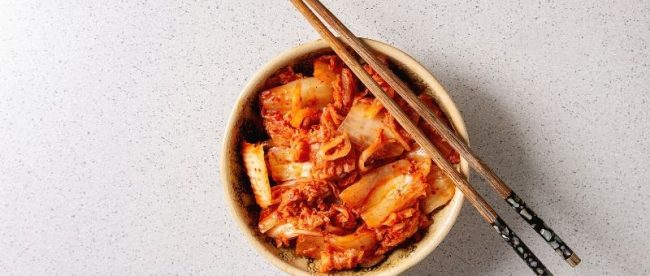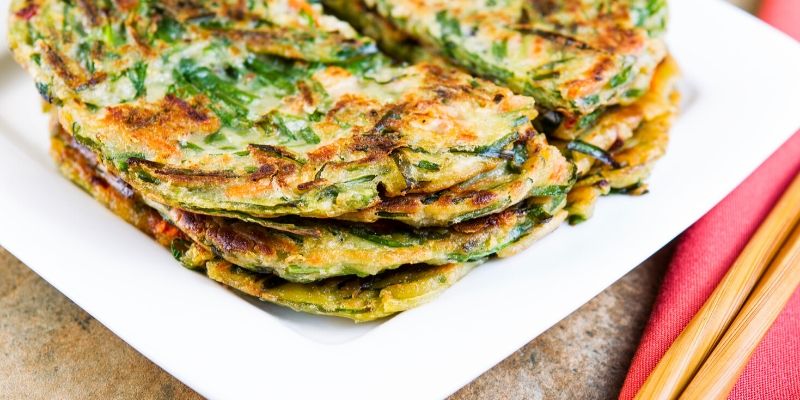Is Kimchi Keto? What Are The Benefits? (+ Keto Kimchi Pancake Recipe)

“Kimchi” is Korean terminology for fermented vegetables. And it’s one of the staples of Korean cuisine. Globally, this dish is recognized as fermented cabbage, but Koreans “can make it out of anything edible.”
The beneficial power of kimchi comes from vitamin C, antioxidants, and the lactic acid bacteria that, according to some researchers, helps with digestion and boosts immunity too.

South Koreans consume 77 pounds of it per capita annually. Healthful or not (I’ll cover it in detail), kimchi is growing more popular not only in its homeland but globally too. So “Is kimchi keto?” is turning into a very legitimate question.
Especially since low-carb diet followers are always open to trying something new, kimchi included. And that’s what I’ll cover in this article.
Are you interested in a particular topic about kimchi and keto? Then use the table of contents below to jump to the most relevant section. And you can always go back by clicking on the arrow in the right bottom corner of the page. Also, please note that some of the links in this article may be affiliate links. For more details, check the Disclosure section at the bottom of the page.
How many carbs does kimchi have?
Depending on the recipe, the number of carbs in kimchi may vary. The most common ingredient for traditional cabbage variation of the dish might include spring onions, gochugaru (chili powder), ginger, garlic, etc.
So all of those are relatively safe on keto (and vegan keto too).

1 cup serving of your typical recipe kimchi contains 23 calories, 4g of carbs, 2g of fibers, 2g of protein, and almost no fat. That nets to 2g of carbs per serving.
So since kimchi contains a fairly low amount of net carbs, then you can absolutely eat kimchi on keto. However, you would need to combine it with high-fat foods to make up for the lack of its fat content.
And also, make sure you are checking the labels on a specific product you are intending to purchase. Because depending on the recipe/manufacture, the nutritional value may vary significantly. (To the point it’s not even keto anymore).

Does kimchi have sugar?
As with anything, there are a lot of different versions of kimchi out there. Store-bought kimchi tends to be loaded with sugar, which is disappointing because that takes a lot of the nutritional value out of it that I love so much. So, to make 100% sure that I’m eating the right kimchi and you won’t be kicked out of keto.
For instance, product lists cane sugar as one of the ingredients. And it has around 6g of net carbs per cup. recipe, on the other hand, is sugar-free and seems to be a more keto-friendly bet.

Is kimchi good for weight loss?
Bluntly claiming: “Kimchi will melt your fat away” is not my style. But there were indeed some experiments proving that this product might be beneficial for losing weight.
E.g., this report from 2011 established that fermented kimchi reduced body weight and improved metabolic parameters in overweight and obese patients.
Another study from 2013 found that consumption of both types of kimchi significantly decreased body weight, body mass index, and waist circumference. It’s all thanks to the fact that fermented kimchi found efficiency in reducing insulin resistance and increasing insulin sensitivity.
Although those are not huge studies, the evidence of kimchi’s positive influence on the weight-loss process is pretty persuasive. So eating it, if you are on a diet, is definitely better than eating tacos (sorry, taco fans, it’s painful for me too).

Benefits of eating kimchi

Many studies were investigating some perks of eating kimchi. I don’t want to go too sciency, but let me mention some of the most interesting.
For instance, scientists from Ewha University in Seoul reported that kimchi lowered the stress levels of caged mice by 30%. And folks from the Institute in Busan found that hairless mice fed kimchi develop fewer wrinkles.
A specific strain of Lactobacillus found in kimchi may boost the immune system and help fight inflammation and prevent yeast infections. And that’s just to name a few.

How much kimchi should you eat a day?
It was once estimated that the average Korean adult eats at least one serving (100g) of kimchi a day. Which instantly places them over 50% of the daily suggested intake of vitamin C and carotene.
However, since this dish often contains lots of spicy and salty ingredients, sometimes eating it with every meal can be too much. And while the dish has numerous health benefits, researches also found some dirt.
E.g., kimchi and other spicy fermented foods can potentially be linked to the most prevalent cancer among Koreans. For instance, rates of gastric cancer among Koreans and Japanese are 10 times higher than in the United States.

How long does kimchi last in the fridge?

When properly refrigerated (below 39°F (4°C), kimchi can last 3–6 months. It continues to ferment as it matures, though, becoming more acidic and softer. So, If you prefer a milder flavor or crunchier texture, you may want to discard your kimchi after 3 months.
If you are planning to keep it in a fridge, make sure that all of its ingredients are fully covered in the brine before you reseal it. And always use clean utensils to pick it up, as dirty ones may add up some unwanted bacteria that can cause decay.
Kimchi stored at room temperature lasts for 1 week.

Keto kimchi recipe
Keto kimchi pancake
One of the most beloved dishes of modern western hipster foodies is kimchi pancake (also known as Kimchi-buchimgae or kimchi jeon. The typical recipe includes all-purpose flour and sugar along with the kimchi. But I have a fantastic keto (and vegan) friendly variation of kimchi pancake for you. And I hope you’ll give it a shot. It’s absolutely delicious.
These are really special. Full of flavor, vegan, keto, and easy to make
Notes
1 pancake wedge has only 0.9 net carbs, which makes it quite a keto-friendly treat.
This dough is both easy to undercook or get it burnt. So pay attention to the frying temperature.
Ingredients
- 1 ½ cups cauliflower rice chop/grind
- ½ cup of kimchi
- 2 flax eggs (2 tbsp of flax meal mixed with 6 tbsp of lukewarm water)
- 6 tsp coconut aminos (2 for batter and 4 for the dipping sauce)
- 2 tbsp of flax meal
- ¼ tsp coarse salt
- Chopped scallions to taste
- Onion powder to taste
- White pepper to taste
- 1 tsp of toasted sesame oil
- 4 tsp of rice vinegar
- White sesame seeds to taste
Instructions
- 1. Chop cauliflower in a food processor to get the “rice” texture.
- 2. Microwave it for 1.5 minutes till soft. And then set it aside for a while.
- 3. Combine flax eggs, kimchi, 2 tsp of coconut aminos, salt, flaxseed meal, scallions, pepper, and onion powder and mix well.
- 4. Get back to your “rice.” Squeeze out the liquid content using the cheesecloth. And add it to the mixture.
- 5. Preheat evenly greased skillet. Pour the batter mixture in and gently spread it around.
- 6. Fry it over the low heat for about 5 minutes or until the edge is in light golden brown. And then gently flip it to cook from the other side for about 3 mins or until golden brown.
- 7. Meanwhile, take care of the sauce to go with the kimchi pancake. Mix together sesame oil, rice vinegar, sesame seeds, and scallions.
- 8. Once your pancake is cooked, slide it out of the pan over a wire shelf, so it won’t get mushy and slice to 8 wedges.
- 9. Serve it with the sauce at room temperature.
Nutrition Facts
Keto kimchi pancake | Recipe card
Serves: 8
|
Amount Per Serving: 1 slice
|
||
|---|---|---|
| Calories | 61 | |
| % Daily Value* | ||
| Total Fat 3.9g | 4.6% | |
| Saturated Fat 0.4g | 0% | |
| Trans Fat 0mg | ||
| Cholesterol 0mg | 0 | |
| Sodium 84mg | 3.5% | |
| Total Carbohydrate 3.5g | 1% | |
| Dietary Fiber 2.6g | 8% | |
| Sugars 0.6g | ||
| Protein 2.1g | ||
| Vitamin A 0mg | Vitamin C 0mg | |
| Calcium 16mg | Iron 2mg | |
* Percent Daily Values are based on a 2,000 calorie diet. Your daily values may be higher or lower depending on your calorie needs.
Vegan Keto Diet Recipes and Tips

Thanks for the graphics: Canva.com
Disclosure: At vegketodiet.com I only mention the products that I researched and considered worthy. But it’s important to note that we are a participant of several affiliate programs, including but not limited to VigLink and Amazon Services LLC Associates Program. As an Amazon Associate, this website earns from qualifying purchases. Also please note that I am not a doctor. As such readers are strongly recommended to make decisions that might affect their health by doing their own research. At vegketodiet.com I only document and describe thoughts, researches and ideas that proved to be working for me.


